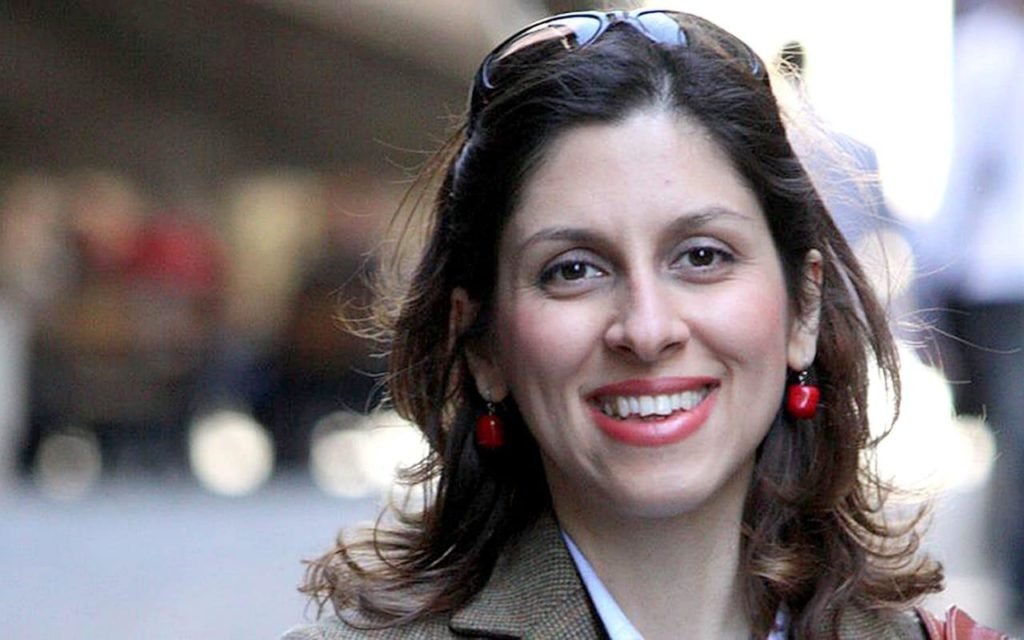Richard Ratcliffe and his five-year-old daughter Gabriella met the Prime Minister and Foreign Secretary Dominic Raab to discuss Nazanin Zaghari-Ratcliffe’s imprisonment in Tehran, which continues after nearly four years.
Richard Ratcliffe spoke to the Prime Minister in Downing Street at midday as he re-doubles the pressure to free his wife, who has been detained since 2016.
Mr Ratcliffe last met Mr Johnson when he was foreign secretary in 2017.
Any optimism over Ms Zaghari-Ratcliffe’s chances of freedom has been dampened by the soaring tensions with Iran provoked by the US killing of its top general, Qassem Soleimani.
Clutching his daughter’s hand, Mr Ratcliffe told reporters: “In truth, no breakthrough,” when exiting the meeting.
Richard Ratcliffe has said the Government needs to be “tougher” with Iran in its effort to secure the release of his wife Nazanin Zaghari-Ratcliffe.
Following talks in Downing Street with Boris Johnson, Mr Ratcliffe told reporters there was still a “gap” between them as to how to approach the issue.
“I think there remains that gap between my sense that the Government needs to be tougher with Iran, alongside improving relations generally, and the Foreign Office instinct to not have things escalate.”
“I don’t think I have come away thinking Nazanin is coming out tomorrow or even next week and I will think carefully about what I tell her on the phone on Saturday about where the hope is to come.”
He said Nazanin was being held hostage and used as a “chess piece”.
He added: “That wasn’t disputed in there, whatever the terminology. The UK obviously is wary of that tightrope it is walking between the US and Europe in Iran relations and the JCPOA (nuclear deal) and the dispute mechanism and so on.
“I was saying ‘I think this is different’. This is a global norm, that actually we all uphold universal values where hostage-taking shouldn’t be happening.”
Mr Ratcliffe added: “I don’t stand here hopeful, if I’m honest. I stand here with my wife still in prison and things aren’t moving.”
But he said he would “keep going and keep pushing”.
Mr Ratcliffe, who took his five-year-old daughter Gabriella with him to the meeting, had previously said he wanted the Prime Minister to be brave.
Speaking on the BBC Breakfast show this morning, he said: “You remember he made us a strong promise a couple of years back to leave no stone unturned. I want to ask him to be brave.”
Ms Zaghari-Ratcliffe, a 40-year-old mother from London, is serving a five-year sentence after being arrested during a holiday with her daughter and accused of spying.
Her family and the UK Government have always maintained her innocence and she has been given diplomatic protection by the Foreign Office.
Diplomatic protection is a little-used mechanism the Government can use to attempt to help individuals it believes have been wronged by another state.
It raises Ms Zaghari-Ratcliffe’s treatment by Iran to become a formal state issue and recognises that the legal proceedings brought against her failed to meet international standards.
Mr Johnson has been persistently criticised for wrongly claiming when he was foreign secretary, that she was training journalists at the time of her arrest.
Four days later she was summoned to an unscheduled court hearing during which Mr Johnson’s comments were cited as proof she was engaged in “propaganda against the regime”.
Ms Zaghari-Ratcliffe is among as many as five people with dual British-Iranian nationality, or with UK connections, believed to be in prison in Iran.
There are some hopes that diplomatic tensions could ease between London and Tehran if a long-running £400 million dispute is settled in the Court of Appeal this week.
Iran’s ambassador to the UK, Hamid Baeidinejad, tweeted that if a portion of the debt is assigned to Tehran then it will mean “the legal process of the case is coming to an end and there will be no excuse for default” from the Government.
The sum has been outstanding since pre-revolutionary Iran paid the UK for 1,500 Chieftain tanks in the 1970s.
The deal was cancelled after the Shah of Iran was deposed in 1979, but Britain has refused to heed Iran’s demands to hand back the money.
Ms Zaghari-Ratcliffe’s local MP, Labour’s Tulip Siddiq, called on the Government to pay the sum back to Iran so that her constituent can be returned to the UK and reunited with her family.
Ms Siddiq said in the Commons: “This case relates to the £400 million that we owe Iran as a country, and anyone with a passing interest in my constituent’s case will know that the debt is linked to her imprisonment.
“The Leader of the House (Jacob Rees-Mogg) said that the behaviour of the Iranian government is unforgivable, and I agree with him, but the behaviour of our Government is also unforgivable because we have not paid the money that we owe them.”
Mr Rees-Mogg said the issue is “extraordinarily difficult”.
He said: “The British Government cannot and must not pay or appear to pay, either in fact or reality, money to allow people who have been illegally detained to be released.
“The risk that would cause to other Britons travelling abroad would be very considerable.
“The law must take its course in relation to the money which was deposited here, but it would be absolutely wrong to connect the two issues.”
Kate Allen, Amnesty International UK’s Director, said: “We’ve repeatedly called on No10 to prioritise Nazanin’s plight as well as the other UK-Iranian dual nationals unfairly jailed in Iran, so this is a welcome step from the prime minister.
“Given recent deeply unsettling events in Iran, it’s all the more important that Boris Johnson provides proper reassurances right now to the family that real and concerted efforts are being made at the highest levels to secure Nazanin’s release.”
